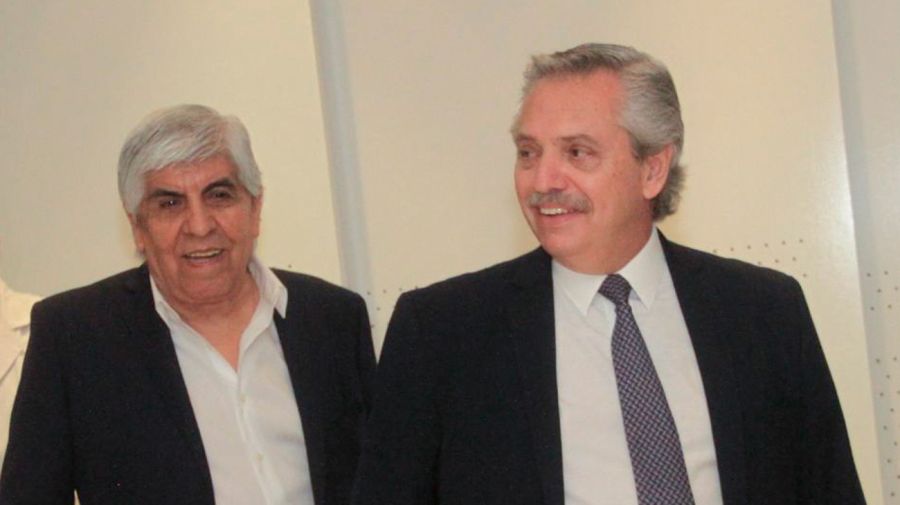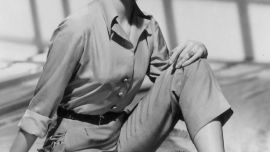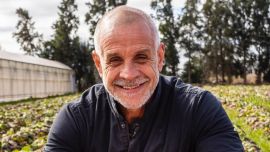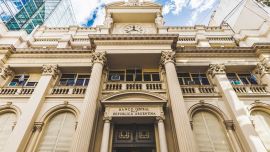Argentina’s failure has been not to create more formal private jobs over the last 50 years, a period during which the country’s population doubled. From the side of the workers, the most representative and fundamental figure of the previous half-century has been Hugo Moyano. A “hero” of the struggle against neoliberalism for his teamsters and “villain” of the combat against capitalism for free- market advocates, getting to know him more intimately allows a better understanding of what has been going on in our country’s labour world.
Now aged 77, Hugo Moyano is approximating the metaphor of “herbivorous lion” of Perón in his last months – milder, more conciliatory and weary. The 140-minute conversation (published word for word in PERFIL) ranges over various issues. At times it resembles the free association therapy typical of psychoanalysis, where the method is not to refute but to go with the flow, in this case leaving readers free to draw their own conclusions.
Before we started this interview, you told me that at the age of 10 you were already working in a cold cut factory in Mar del Plata, La Atlántica.
I started chopping and boning meat there, labelling the salami four by four, attaching toothpicks and then hanging everything out to dry. Afterwards I was a delivery boy for a butcher. By the age of 16 I was already attending the counter and packaging.
And then at the age of 17 you entered Verga Hermanos, the first trucking company you worked for.
Yeah, transport. My dad worked there. Before that he had also worked in Platamar. He asked me if I wanted to do the same. I was then working off a bike, the only thing we had in the family – a Reyes [Epiphany] present for my younger sister. I took it off her and went to work on a woman’s bicycle. That’s where my story begins.
At the tender age of 18, you were elected a union branch delegate in Mar del Plata.
I was indeed very young. It happened in an instant at a meeting. Garbage collectors were then still not recognised as belonging to the union. We fought over that and we had a secretary-general in the union who was a great guy – a Communist. He went to the Labour Ministry with a presentation and then came and read out to us what had been discussed. There were some comings and goings but the garbage collectors could not join. They wanted to in order to improve their wages. At some point a comrade said: “Why don’t we have done with this, why don’t we go on strike?” And they told him in answer that we could all go to prison. Then an old man spoke out: “And do you imagine that the prisons were built for dogs? No, they were built for men! If we have to go to jail, we will.” Those things encouraged me. I was just a kid but older people were talking that way.
In 1971 at the age of 27 , you were elected secretary-general of the CGT (Confederación General de Trabajo) Delegation, a meteoric rise.
I competed with the previous secretary-general. I realised that people saw that since I was young, I had plenty of drive. When there was a vote for the first time in history [it was a Sunday], there was a queue stretching over something like 70 blocks. That was an eye-opener for our people in Buenos Aires. They began to see Mar de Plata as an important branch. With that momentum I won the election.
Do you attribute being so adult at the age of 18 to having started work at 10, giving you the vigour of youth and the experience of somebody more mature?
I had plenty of drive but it’s not as if we swept all before us, as many people would make it seem, no. Our claims were incessant. I said at the time that if we had opposition, we would not be able to manage the union but I never did have any opposition. Opponents for sure, there are always opponents everywhere, but they were never organic or up to presenting a list against me in the union. Even though there was freedom and democracy. The popular recognition of us teamsters is huge.
When did you stop driving a truck?
I left Verga because they had trucks in Buenos Aires but none of their own locally. I drove unregistered lorries aged only 18 [or] 19 but the drivers of Buenos Aires let me drive their trucks all the same. I remember we drove out of Buenos Aires with a packet of yerba mate and chatting and then the other said: “You drive” and went to sleep. It was a Volvo 495, a huge vehicle for those times. When we reached Dolores, the police stopped and my sleeping partner only woke up when I slammed on the brakes. The cop looked at my very youthful face and said: “Che, you wouldn’t have a bit of yerba, would you?” “Yes, take it,” I said, handing over the quarter-kilo packet of yerba we had just bought. As we were driving on, I said to him: “Just as well he didn’t ask for any licence!” My sidekick looked at me and said: “Why do you think I gave you that packet of yerba?” I have lots of anecdotes like that …
Until what age did you drive?
Until my union activities began in 1971.
In 1987 you were elected secretary-general of the teamsters with four reelections (1991, 1995, 1999 and 2003). Also in 1987 you were elected deputy for Buenos Aires Province. Was that with Antonio Cafiero?
Yes, I was on Cafiero’s [Renewal Peronist] list. Previously I held various posts on the Mar del Plata branch of the Justicialist Party – secretary-general. chairman, deputy chairman and secretary.
The secretary is often the one who has to do all the work
Yes, he has to work.
Did you already notice your differences with Carlos Menem, that things would not work out well with him?
Yes. I respect elected governments but if they distance themselves from defending the workers, I’m always going to stay in the same place. I never liked Menem’s policies. I don’t want to exaggerate but when he began to hand over the assets of the Argentines, our position was firm.
Argentina today has seven million formal private-sector workers just as when you started out. To what do you attribute Argentina’s failure to create jobs?
There are many factors, primarily neoliberal policies.
During the dictatorship and the 1990s?
Of course, it allowed businessmen not to pay attention to worker claims.
Thus creating informal employment?
That’s what neo-liberal policies caused.
There are only seven million people in formal private-sector jobs when the population has doubled [since 1970].
The national policies have to do with that. As the General [Perón] said, there is nothing better than an example. They tell us it costs 10 pesos to import a jug and 30 to make it here so we start importing. But when the factory here shuts down and the workers are fired, we’re giving jobs to foreigners, paying more than the value of a jug. This country went overboard with imports, closing down many textile factories when measured against the volume of imports. In the 1990s imports did indeed sometimes cost less than the national product. Peso-dollar parity produced chaos.
What did you think when Joe Biden said: “Wall Street did not build this country, the middle class did and the trade unions were the ones who built the middle class.”?
It made me think that at last they are starting to understand Juan Perón and they understand because it’s the reality. Wealth is created by the workers. The conditions for creating jobs must exist. There’s a lot to be done.
When did you find out about the existence of Jimmy Hoffa, the archetypal teamster of United States trade unionism?
Fundamentally after seeing the movie, for all the talk about it. [My son] Pablo is in the International Transport Workers’ Federation (ITF), as I was too but he’s climbed a bit higher. I was ITF vice-president worldwide for land transport whereas he’s ITF vice-president worldwide for transport in general – aviation, shipping, the lot.
What do you think when Amazon, the biggest employer in the United States, takes a vote over a trade union and the workers vote against having a trade union?
That it could be a manoeuvre, that they want to modernise slavery – to me it can be no other thing. I’m not saying that there is nothing in the law which needs changing. There are things which may be modified but the trade unions should do it. Our collective bargaining agreement goes back to 1987 as its sole base. The average time on the road was 35 to 40 percent before that year whereas today it is 70 to 80 percent. You used to set out for Mar del Plata at 6pm and arrive at 6am the next morning in those big lorries. Today a truck takes seven or eight hours, 10 at most. You have to go, adapting things to this reality without going back in time. I do not deny that there are things which are useless to workers in practice. One example is sending people out on the street to work without safety.
If Rappi, PedidosYa or at one time Uber construct mechanisms of labour relations without trade unions, what is your reflection on that? Are those also new generations of modern slavery?
There are employees who do not even know who their boss is. They send them to certain places with all the risks that signifies, whether it be night or day.
Motorcycle and bicycle transportation are other forms of what teamsters do.
Humanity’s most important invention is said to be the wheel. We move on wheels. That’s an advantage. There are many things to update while ensuring that there is no direct risk, either immediately or in the future.
If they generate advantages for the common good, we need to modify what is adverse, don’t we?
Logically.
In Argentina, 86 percent of freight transport is trucked. What is the situation in other countries?
High everywhere. The lorry is more practical. When they talk of door-to-door transport, this means going straight from the factory to the place of work. If the item is transported by rail, you have to unload it from the train and then take it. Trucks save time as well as being much more practical, efficient and cheaper.
How do you imagine a future in which cars and trucks do not need human drivers? With 5G that will probably come to pass in 15 years, land transport could be driverless.
In the United States they wanted to put that in practice and it failed.
So it’s not going to happen?
It won’t be easy. Many things are changing but it does not seem to me that it’s going to be easy. Almost impossible. Not only the roads need to be taken into account. For example, you have double-decker lorries. Our workers who drive them pick up a bonus, a wage and a half. They are very expensive vehicles and there are few of them. In many places the roads are not ready for them and the bridges are not high enough for the most modern trucks. Those things need study and adaptation.

Things neither you nor your son will see?
If I live as long as my mum, perhaps I will see some of those things.
Last Teamster’s Day Alberto Fernández said: “If Hugo hadn’t headed the CGT with Néstor, we wouldn’t have been able to do what we did.” How was your link with Néstor Kirchner and Cristina Fernández de Kirchner from 2003 onwards?
It was very good with Néstor, he was very special. I got to know him when introduced by a comrade [Julio] Ledesma, who was militantly with the Kirchners. He said to me: “Why don’t we go and talk to Kirchner to see if we can get him to team up with [ex-president] Adolfo Rodríguez Saá?” Each of us was working in the other’s campaign and we tried to bring them together.
To beat Menem?
Of course. He attended me in an office and we greeted each other. “No problem with me”, Néstor told me, “whoever carries more weight [presumably in opinion polls] tops the ticket.” Afterwards I saw him in the [Labour] Ministry when he was president.
And what was Cristina like?
She was different. We also discussed the same things, family benefits and payroll taxation. I was always trying to get on top of her. If something was, say, 70 pesos, I would ask for 130 peos.” Then I would say: “Cristina, 100, and you’ve got yourself a deal.” And she would reply: “But, Negro, the difference is now down to five pesos,” to which I would respond: “Five pesos are four kilos of bread, Cristina.” I approached her from that angle and she would accept. Once I asked her: “How is it possible that two-month gas bills in [posh] Barrio Norte are the same as in a working-class neighbourhood?” That’s what the lads should be disputing. A two-month gas bill cannot be worth less than a gas canister in our neighbourhoods. With arguments like that I always won her over.
And Alberto Fernández?
I often talked to him when Néstor was president. We have a good relationship.
And how does he differ today from when you knew him as Cabinet chief?
To me he’s the same. He has a pretty important intellectual capacity. The situation of the country is different. Many people do not understand that. The worker does because not only did he take over a country in debt but the pandemic has done a lot of damage. Despite all that he keeps moving forward.
As vice-president, Cristina Fernández de Kirchner has modified the wage bargaining guideline from around 30 percent by giving Congress employees about 40 percent, and then a few weeks ago your trade union clinched 45 percent, thus leading all the other trade unions to claim the same. Were the teamsters the wage bargaining benchmark for everybody else?
Everybody discusses wages in accordance with the inflation we’ve had. We’ve signed a trigger clause [providing for the renewal of collective bargaining if inflation tops the wage increase]. Every year we have a special bonus for the start of classes [March] and the end of the year. We won’t modify anything we’ve been signing for ages. I don’t know about other trade unions. They’ve had some inconveniences but that does not modify other things.
[Economy Minister] Martín Guzmán set an inflation target of almost 30 percent with the first wage bargaining along those lines. But inflation topped that 30 percent to hit 45 percent. Don’t you fear that if collective bargaining confirms 45 percent, inflation could move up to 50 percent?
That worry exists. You don’t want it to happen but it does. We have a very good relationship with the business sector whose situation is understandable with many inconveniences, for example, the issue of tyres.
Which are imported and they cannot get them.
Of course. Fuel and highway tolls have also gone up, sums adding to costs. That’s pretty understandable even if some negative personalities go badmouthing transport. That’s all lies. I can assure you that when we sit down with serious business people, the wage discussion is totally responsible and respectful.
It was one of the calmest.
I thanked many companies when we closed the wage bargaining. Many of them donated respirators and other things for the clinic. That’s very important.
Normally recession halts inflation because prices cannot increase when people have no money. As Roberto Lavagna has explained, it is the other way round in Argentina because in a crisis the costs remain fixed while less is sold so that prices have to go up to pay them and these costs include wages. As far as your trade union is concerned, transport is always necessary or declines less but other activities find companies unable to pay. When you talk to your trade union colleagues, do you find that the teamsters can get more wage hikes than others?
Teamsters have made huge sacrifices in both physical and psychological terms, taking one or two years off their lives as detected by tests. Teamsters are permanently anguished because they leave their families for as much as a fortnight because they drive abroad. Some comrades cannot watch their children growing up and cannot spend special moments like birthdays with them because they were on the road.
They were essential during the pandemic.
Of course. And the most painful thing is that at times they lose a loved one and cannot be present.
So it’s a more demanding job and that should be remunerated?
Hence the recognition. It’s a very great responsibility. A businessman said some time ago: “I ought to dismiss my drivers with a kiss on the forehead. His vehicle is worth US$150,000 and his cargo the same again so he has US$300,000 in his hands. How am I not going to pay him well, how am I not going to recognise that effort and responsibility?” That’s the difference.
How much of Néstor Kirchner’s vision continues in the current government ? Alberto Fernández speaks of “we” when he refers to Néstor.
The intentions are similar but at different political times, both locally and internationally. Some people do not seem to understand what’s going on with the pandemic. We have to live through it. My wife, who is in charge of the Sanatorio Antártida hospital, talks to doctors all day and keeps an eye on medical supplies. Responsibility means throwing in everything and society has to understand that. Most do understand that the government is making a very big effort. If it were not for the humane instincts of the president in avoiding a greater loss of life from Covid-19, the situation would be much more serious. The president worries a lot about that and this at times does not permit other things to work as they should.
Will the government win [in November]?
I think so. I talk a lot to the workers, not only our own lads but different sectors, apart from union leaders. A long time ago I went to see Lorenzo Miguel, of the UOM metal workers and all the other leaders when I was a kid. Now other youngsters come to see me. People understand this reality. Not doing so is to ignore reality. We not only see that but we have to live through it. We’re all in danger, regardless of whether we are vaccinated or not. We’re all in danger of infection with the new strains. Despite all that, the government is trying to carry forward a policy. There are many people in extreme need, That’s real too. We’re doing this in an organised way, not just going around talking. I have a group of comrades who are working hard on this. They’ve made millions of plates of food for those who have the least. Many trade union organisations are doing this, as are other sectors of society. With the best of will because we all want the country to move forward.
What did you think when the Pope told the International Labour Organisation that private property is a natural but secondary right?
Those are messages which speak of a future beyond the current situation.
Will there be a more egalitarian society in the world of the future?
As a Peronist, like the General said, I accept the trends, a bit to the left, a bit to the right but not extremes. Those are no use but the trends function as a kind of management. I manage a trade union organisation which is bigger than very many companies, an institution created to defend the rights of workers. That’s beyond discussion but it must fulfil an important function in society because we have 12-15,000 direct or indirect employees beyond the activity – workers who depend on the organisation.
So you employ at least 12,000 people?
We in the labour movement are sometimes more than an entire industry. There are trade unions which have many more people. The numbers come from the tourist hotels and health installations we have for the workers, employees who belong to the organisation. We are a highly important institution. The trade union organisations are also part of the policies implemented in this society, not only for what they represent but for the employees they have.
Do you feel uncomfortable with that famous photo of you with Mauricio Macri?
They ask me if I regret it. The answer is no. I criticised Cristina’s way of doing things but basically it comes down to the principles I have always embraced: not to incur debt and not to depend on international policies, as other presidents have done.
Did you imagine Macri would be like that?
No.
Did you have different expectations?
No, I simply never imagined that there would be a Macri. I was never close to him, as they say. I went to the monument because it was a monument to our leader, Juan Perón and because [the late farm hands union leader] ‘Momo’ Gerónimo Venegas asked me to. I was a great friend of his.
Did you have any relationship with Mauricio Macri’s father, Franco?
Yes, he was a regular guy. We talked more frequently. That was at the Belgrano Cargas rail freight line when Kirchner put us [the transport and railway unions] in charge. He told us that there would be investments.
Millions of dollars.
At some point I asked him: “Che, but is a private company putting up the money?” “No, no, the state,” he replied. I answered: “That’s so easy when the state pays everything.” Those were the conversations we had.
Did you feel used when you saw the photo?
No. We met up with Macri because he was City Mayor, the same as Horacio Rodríguez Larreta whom I’ve met now under this government.
An institutional bond.
Clearly.
Would you agree to some kind of labour reform which would create jobs under conditions different from the current?
What cannot be accepted is the slavery of the working man. There are things to be modified with all this technological advance, as we were discussing with lorries.
Gerardo Martínez [of the UOCRA building workers union] is rumoured to be next CGT secretary-general. You said: “There is an important sector outside the CGT with whom that candidacy was never discussed. Consensus has to be general, not just between some. For there to be unity, there has to be a CGT which presses worker claims, not one which signs off on lower wages.” Who would you like to be the next secretary-general or who should it be?
Or who would I not like it to be.
Answer any of the above three questions.
There are many young lads doing well. Apart from that I would try to add experience in order to avoid previous errors. A future CGT has to fulfil the role we spoke about at the beginning. Its organisations are institutions within a country, institutions with an important number of employees. It has to fulfil a role, not only defend worker rights. It has to be at the table to define fundamental economic policies.
Does the current CGT fulfil that role?
No. These are very difficult times and it’s not easy for anybody being in their position. I’m not defending them, not at all. They do what they can and what they could do has not been so beneficial. The pandemic has stretched out their mandate. The change should come next month.
Could you tell me who you would like or not like it to be [heading the CGT]? One of the two. You make the pick.
For example, I would not like it to be a certain teamster Hugo Moyano. I think I’m the only one to have served out three consecutive terms.
So how about your son, Pablo?
That has to be decided by the majority. The important thing is for there to be consensus and unity to carry political weight.
At the end of an interview of over two hours, is there anything I haven’t asked you and that you would like to add?
Some people criticise me, like the newspaper La Nación. I’ve worked since I was 10 before I was regularly employed by Verga Hermanos at the age of 18 when I started making my pension contributions. I left them to do my military service, returned and then moved on to Santulli, always a regular employee making my pension contributions. I was elected deputy in 1987 and I could have started collecting a deputy’s pension over 30 years ago but I kept on contributing – it would amount to over 100 million pesos by now, paid to the state for all pensioners.
I would like to ask such critics as Patricia Bullrich or Florencia Arietto, do they contribute more to society than I do? I’m 77 and I do not think of retiring but keep on contributing. I’ve turned a hospital into the best in the country, my pride and joy, and we have 10 more nationwide. If I were what they say I am, would I have contributed 150 million pesos to pensioners? No, I’d be collecting a deputy’s pension.
I always say with Pablo, one day Clarín, the next La Nación. We start to worry when they don’t attack us, when we don’t appear in the newspapers. The more they criticise us, the more people support you. If it had not been for this pandemic, I’d stage a rally in Plaza de Mayo and 9 de Julio with 800-900,000 people. Who could do that ? That human junk?
To what do you attribute those criticisms?
Primarily to my being on the side of the worker. That’s my place, whatever. I’m friendly with everybody but if you want to make an enemy of what I represent, you’re my enemy.
Do you believe yourself to be the victim of the same system of lawfare of which Cristina Fernández de Kirchner complains?
I haven’t the least doubt. They’ve raided me over 20 times, all over union premises, even our driving school. I don’t know what they were looking for there. The ex-president, and I say this with respect for the human being, cannot be right in the head. He cannot do so many things with so much malice. I’d like to see a worker who at any time was not paid his due and was not defended by us. We’ve always defended workers to the death. Those people are the enemies of those who have the least, of the workers and those who defend the workers. Unfortunately, that’s the way it is.


























Comments